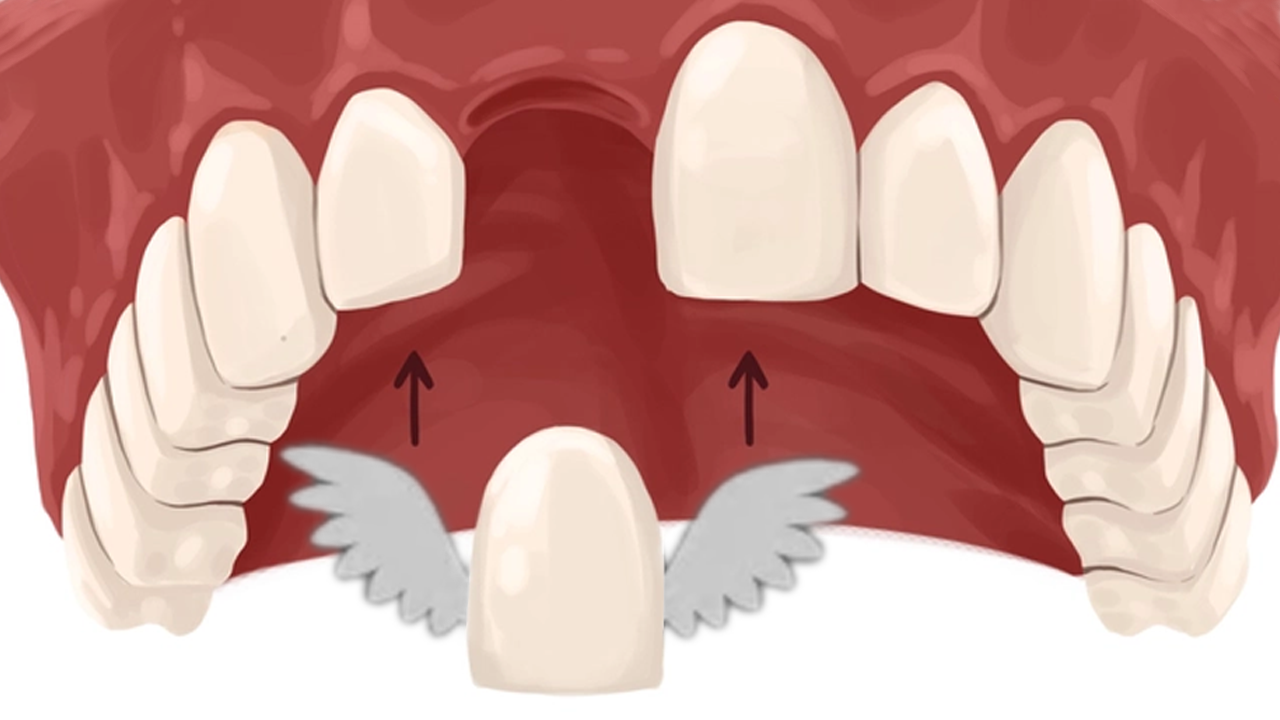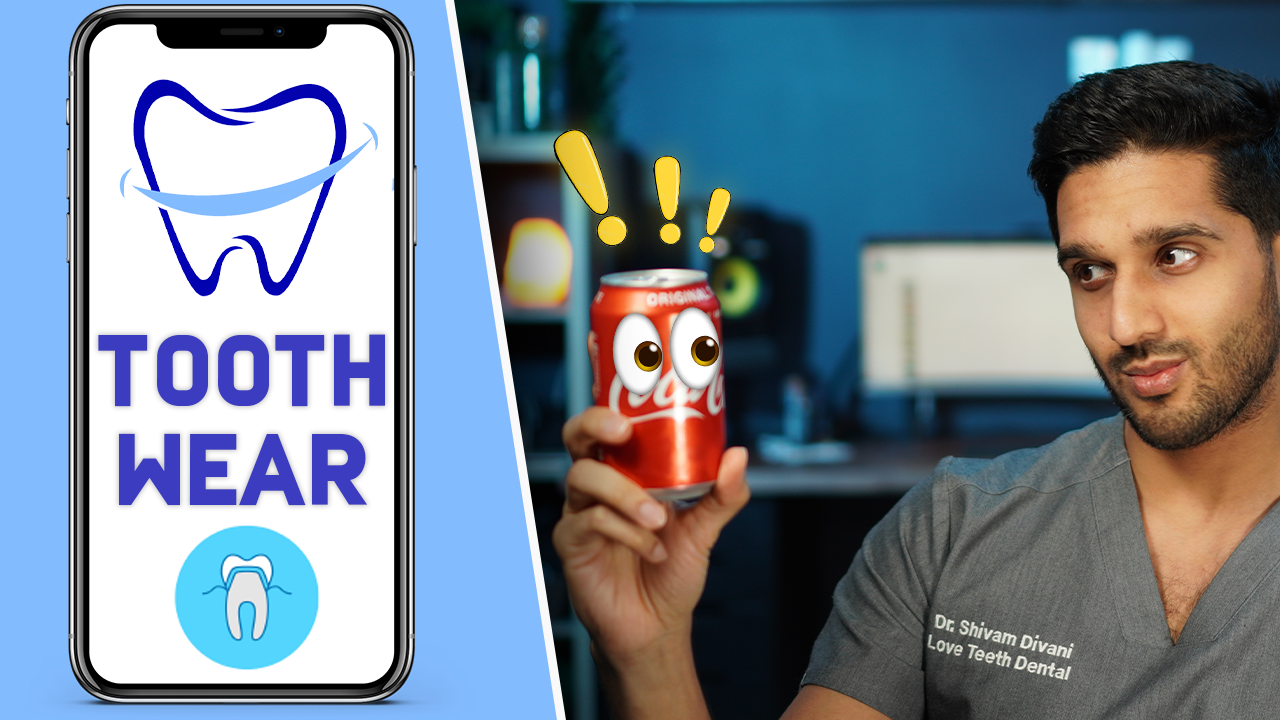If you prefer videos, watch the youtube video where we cover our 3 part series on how to study smart. During my A-levels and high school I always performed really well in exams. And then I went to university to study Dentistry and it all went downhill. I went from getting over 90% in all my exams to just scraping a 50% pass. It was only around 4th year when I read this book that I realised what the problem was. Stick around to find out.
What’s up guys, I’m Zoh, I’m a foundation Dentist working here in London and this is the second blog of our 3-part series on how to study smart. In the first blog Ali talked about why you should be revising in 3 hours blocks using deep work – check out that blog if you haven’t, But in this blog I’m going to cover the principles layed out in the book “Make it Stick” which will explain HOW you can actually be making those 3 hours of revision as effective as possible. The three principles i’m gonna talk about are Active recall, Spacing and interleaving, and then I will show you how you can easily implement these three principles into your revision with a free app called Anki.
So in a 2009 study, they asked college students “What kind of strategies do you use when you’re studying?”, and the most common answer was “re-reading notes or textbooks”. And that’s exactly what I was doing at the beginning of university. I would be reading my lecture handouts, making notes and repeatedly reading the notes before my exams. And it wasn’t working for me at all and it showed in my grades. But how did I do so well before in high school and sixth form? Well the answer is I was doing past exam papers. That was my main type of revision which is a form of active recall. But I didn’t have any past exam papers at university and that’s why I struggled so much.
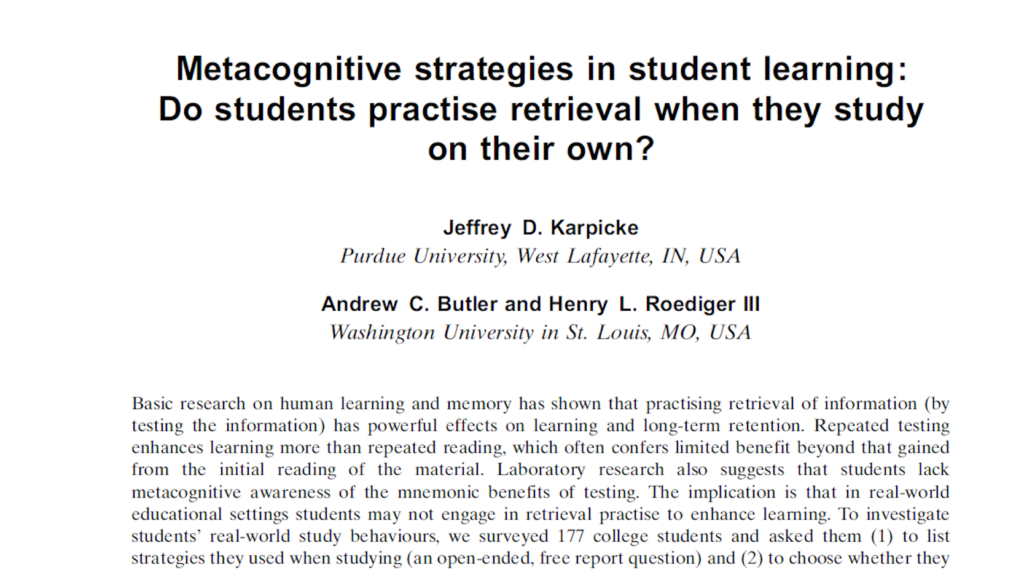
The authors in Make it stick say that re-reading is a learning illusion, it’s too easy. The more you repeat it in a single session, the more familiar it becomes and in the moment, the less you struggle to remember it and you get this illusion of fluency. They say: “Learning that’s easy like this, is like writing in sand. Here today, gone tomorrow.”
Active Recall
Active recall or self-quizzing, like doing past paper exams or flashcards is hard. But this effort you have to put in to answer the questions and actively retrieve the knowledge, strengthens it’s staying power. The author says “A child stringing cranberries on a thread goes to hang them on the tree, only to find they’ve slipped off the other end. Without the knot, there’s no making a string. Without the knot there’s no necklace, there’s no beaded purse, no magnificent tapestry. Retrieval ties the knot for memory. Repeated retrieval snugs it up and adds a loop to make it fast.”
This concept has been shown in multiple studies. A 2006 study found that students who read a passage of text and then took a test asking them to recall what they had read, retained an astonishing 50 percent more of the information a week later than students who had not been tested.
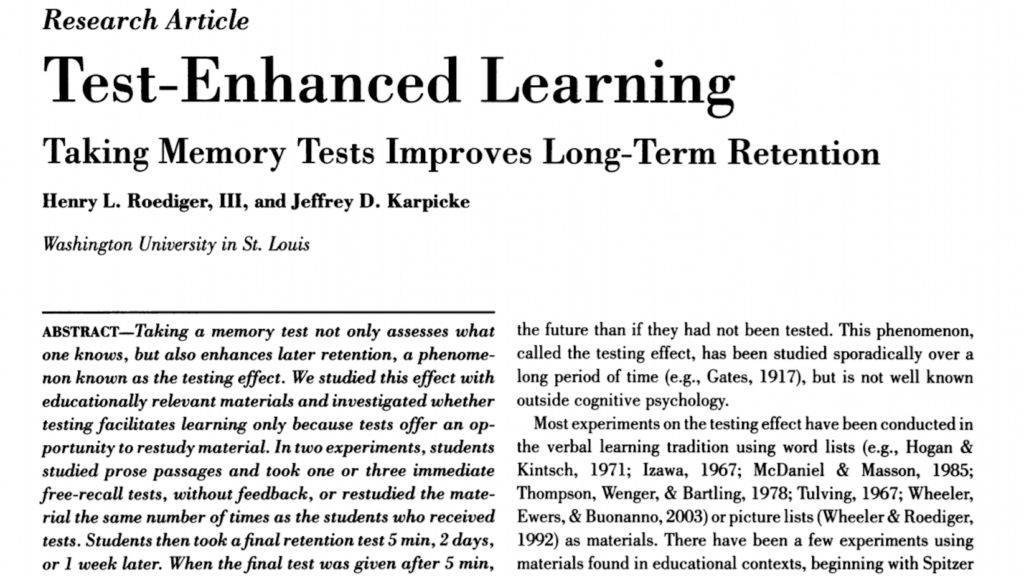
So repeatedly testing yourself helps your memories consolidate into a cohesive representation in your brain and actually strengthens and multiples the neural routes through which you can use to retrieve the knowledge at a later date. At the same time it highlights what you know and don’t know, so you can target your revision to areas of weakness and spend less time revising what you already know.
So what are the different ways of practicing active recall? Well any method where you’re testing yourself is active recall. So it could be answering past exam questions, making paper flashcards, or even group revision where you sit with your friends, pick a topic and take turns quizzing each other. I did this loads with my friends at university towards the end of our revision sessions when we were all getting tired.
Spaced Repetition
So the second principle is about spacing out the active recall. Studies show that spaced repetition is more effective than mass repetition like cramming the night before an exam. And the reason might actually surprise you. The reason you want to space out the repetition is so that you actually forget. Forgetting something makes it harder to retrieve since we last learnt it and if you remember from before, the harder it is for us to retrieve the knowledge the stronger it’s staying power is. In 1885, Ebbinghaus used “the forgetting curve” to show us how information is lost over time as we are always in a constant state of forgetting. What he also found was that information is easier to recall when you reinforce and review the knowledge. When you do this, you reset the forgetting curve, further strengthen the memory, Allowing the rate at which you forget the information to decrease.
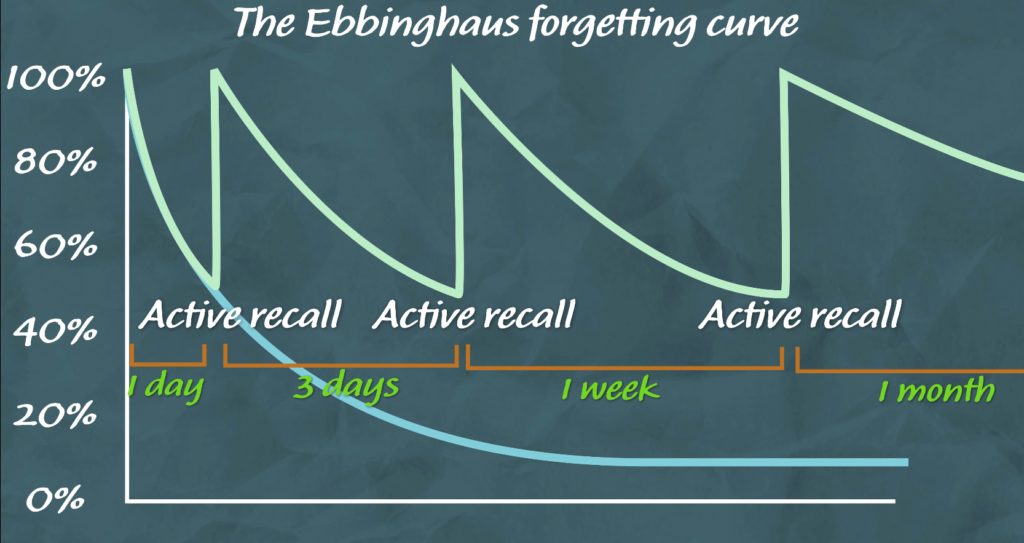
So if you want to apply the principle of spacing to your self-quizzing, you should leave enough space for you to forget the knowledge just enough so it is difficult to recall and when you answer the question correctly, increase the gap in reviewing those questions from a few days to weeks and then to months.
Interleaving
The third principle tells us that instead of just revising just one subject for a whole day or week, we must interleave and study two or more subjects in a day or study session. The book describes a 2007 study where two groups of college students were taught how to find the volumes of four obscure geometric solids. One group then worked a set of practice problems that were categorised by problem type. The other group worked the same practice problems, but the order was randomised or inter-leaved. At the end of practice, the students who worked the problems in categories averaged 89 percent correct, compared to only 60 percent for those who worked the problems in a random order. But in the final test a week later, the students who had practiced solving problems categorised by type averaged only 20 percent correct, while the students whose practice was interleaved averaged 63 percent. The mixing of problem types initially impeded their learning but actually boosted their final test performance.
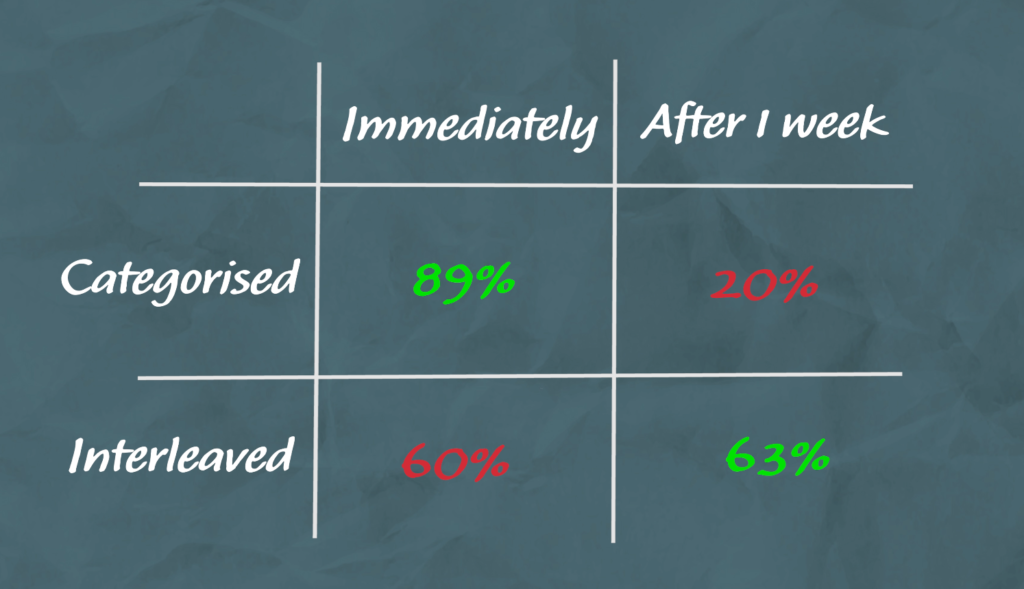
This type of learning is again more difficult as you’re doing it, it feels slower, you might find it confusing going from one topic to another, and just as you’re about to get a handle on one topic, you’re forced to switch. But the research constantly shows this type of revision provides unmatched master and long-term retention.
ANKI
So what is the best way to revise using these 3 principles? Well the simple answer is using some sort of quizzing system like flashcards. The idea is that as you revise a topic for the first time you should be making flashcards and testing yourself regularly. In a second I will go into detail on how you can do this using electronic flashcards in an automated system, but there is a way to use these principles with paper flashcards. It’s called the Leitner system. You create a set of boxes which hold your flashcards and each box represents a different time interval. For example, box one flashcards should be done every day, box two every other day, box three once per week, box four once every two weeks and box 5 once a month. All flashcards start in box one and when you start testing yourself and you get a card right, the card graduates to the next box. But if you get the card wrong, it will return back to box number, no matter which box it was in previously. This kind of system can be quite time consuming to set up and difficult to maintain if you end up making lots of flashcards.
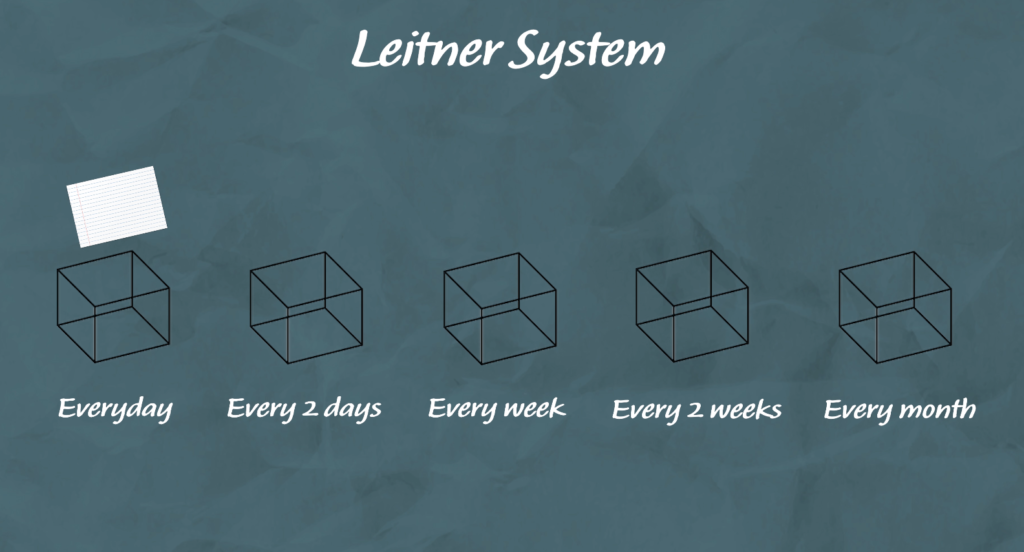
That’s why I suggest using an app called Anki. It’s available for free on all devices except on iphones it oddly costs $25 BUT you can use Anki on iphones by just using the web version on safari. So Anki is an app which allows you to create custom flashcards with text, images, fill in the blanks and so much more! And the great thing about it is that it automatically uses a spaced repetition algorithm to calculate the timing for you. So when you answer a flashcard, you can tell Anki how difficult it was for you, and depending on the answer it will decide when you should be doing that flashcard next. It’s a perfect solution for utlising the three principles we talked about. Now for Anki to work, you need to make flashcards as you revise and you need to make sure you do the flashcards that are due every day. If you stick to it, it is insanely powerful and you will be amazed with how much you can remember. It’s also important to mention that you need to try and make good flashcards. I’m going to put some links at the bottom that explain this very well! You might also be thinking “well there’s no point in me doing this now because it’s too late and I didn’t start making flashcards from the beginning of the year”. But it’s actually NOT too late, I started making flashcards towards the end of 4th year of dental school just one month before my exams. I would say you can carry on revising how you were before, but now as you revise by reading your notes or lectures, have your laptop or phone on the side and make flashcards. Once you’ve made flashcards for a lecture, you know you won’t have to re-read it because you will do the flashcards and that will take care of the memorisation for you. As students we often feel overwhelmed and never know how much revision is enough revision. The beauty of Anki is that once you trust it, you get a massive relief at the end of your revision day knowing that you’ve done all your flashcards for that day and that there’s nothing else left to do. When I finished making my flashcards for one subject, I rarely ever had to do any revision other than JUST doing my Anki flashcards. Sometimes my friends and I would do group revision sessions together where we go through my Anki flashcards. I would read the question in my head and answer it first, I would click for the answer and then I would ask the group. This was useful for me as it gave me a chance to finish my due flashcards for the day, and I was also able to make my flashcards better because sometimes my friends would have better answers.
Now Anki isn’t the only flashcard app that you can use, there are others like quizlet, brainscape, supermemo and many more but as far as I know, Anki is the only free one that integrates spaced repetition.
I hope you guys will give Anki a go! Stay tuned for part 3 of this series where Ali will talk about how to stay focused during deep work revision blocks. If you have the time, I would highly suggest you read the book “Make it stick”, the author goes into a lot more depth and this short blog really doesn’t do the whole book justice. If you found this blog useful I would really appreciate it if you liked and subscribed and make sure to share it with your friends who might also be struggling with revision.
Make it Stick book and audiobook link: https://amzn.to/3bdfMnA
Study on Active recall: Metacognitive strategies in student learning: do students practise retrieval when they study on their own? – https://pubmed.ncbi.nlm.nih.gov/19358016/
Study on Spaced Repetition: Test-enhanced learning: taking memory tests improves long-term retention – https://pubmed.ncbi.nlm.nih.gov/16507066/
Study on Interleaving: The shuffling of mathematics problems improves learning – https://link.springer.com/article/10.1007/s11251-007-9015-8
Anki Download link – https://apps.ankiweb.net/
Some links to videos that will help you create good Anki flashcards:
13 Steps to Better ANKI Flashcards – https://www.youtube.com/watch?v=AbvaITy3oeQ
How to Study Effectively with Flash Cards – https://www.youtube.com/watch?v=mzCEJVtED0U
Check out our other content
If you’re interested, feel free to check out our other Blogs, our Instagram page, or our YouTube channel for more.






